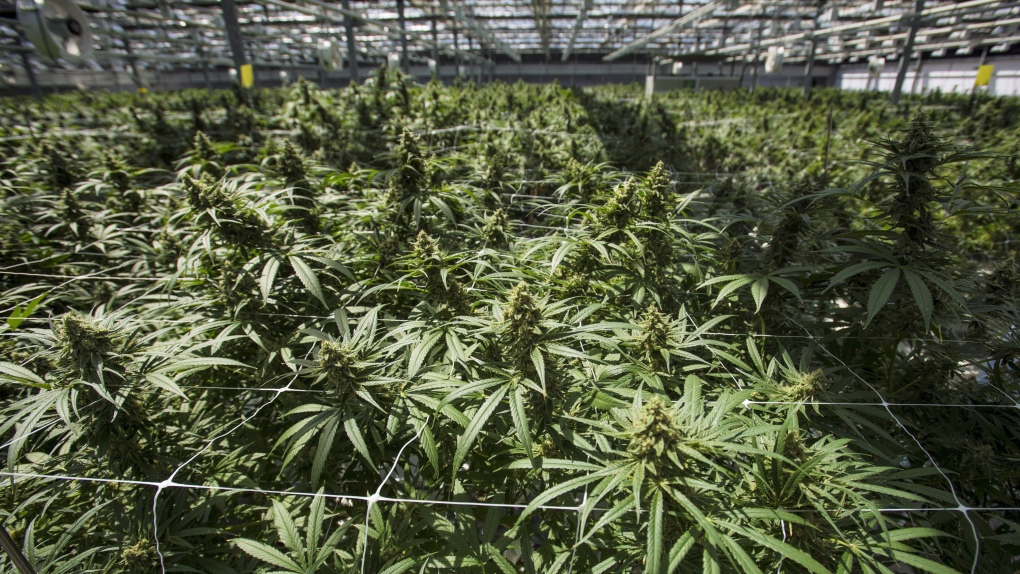B.C. becomes 2nd province to offer farm-to-gate cannabis sales
 Mature cannabis plants are photographed at the CannTrust Niagara Greenhouse Facility during the grand opening event in Fenwick, Ont., on Tuesday, June 26, 2018. CannTrust Holdings Inc. is reducing its workforce. THE CANADIAN PRESS/ Tijana Martin
Mature cannabis plants are photographed at the CannTrust Niagara Greenhouse Facility during the grand opening event in Fenwick, Ont., on Tuesday, June 26, 2018. CannTrust Holdings Inc. is reducing its workforce. THE CANADIAN PRESS/ Tijana Martin
A new cannabis retail licence introduced in British Columbia is aimed at improving the quality of products in the legal market, plus supporting Indigenous and rural producers.
The producer retail store (PRS) licence will come into effect on Nov. 30, according to a statement released by the province on Tuesday. Successful applicants will be authorized to sell non-medical cannabis products from stores located at their cultivation site.
“We continue to look for ways to support growth of the legal market while providing safe and accessible options for British Columbians,” Public Safety Minister Mike Farnworth said in the statement. The new policy was announced just 13 days ahead of Canada’s fourth anniversary of cannabis legalization on Oct. 17.
B.C.’s current framework restricts cannabis producers from operating a retail licence, which Farnworth explains was meant to encourage competition. Ontario never had that restriction in place, making it the first and only province to allow for farm-to-gate cannabis sales.
“Four years ago, our priority was establishing retail stores so that consumers across B.C. would have access to legal cannabis products…At this point our retail store network is well established,” says Farnworth.
The launch of this new policy was three years in the making, and began with a government-to-government agreement between the province and Williams Lake First Nation, the latter of which opened B.C.’s first farm-gate production facility on Secwepemc Territory this year.
Daniel Penny, a project manager with the Williams Lake First Nation says cannabis users will notice the impact of this new framework as soon as it takes effect. Having worked at Unity, a cannabis retail store, and Sugar Cane Cannabis, the 7,000-square-foot production facility, he’s seen first hand how eager clients are to see where and how cannabis grows.
“If craft cannabis is going to have the same success as beer and wine, we need to continue evolving consumption spaces to give people opportunities to touch, taste and smell the product—where tours and testing products are part of the experience,” Penny says.
Not only will the legal farm-gate model allow producers to make meaningful connections with retailers and customers, Penny says it will also lead to higher quality products in stores.
“A lot of products coming into our retail store are about quantity over quality, and some sit on store shelves for months before reaching consumers,” says Penny.
In collaboration with the First Nations Leadership Council, B.C. created the BC Cannabis Products Program in January 2022, with the goal of supporting Indigenous cannabis producers in this budding industry. To date, six First Nations have signed s.119 agreements, including Williams Lake First Nation, though Farnworth says application processing timelines can vary due to things like security screenings and local government or Indigenous Nation recommendations.
While Penny believes there’s still plenty of room for improvement when it comes to B.C.’s legal cannabis market, he’s excited by the past four years of progress.
“We’re excited to continue to grow,” says Penny. “I think there’s a lot of untapped market and people who want to continue learning and getting involved with cannabis. We’ve come a long way in keeping people away from the illegal market and providing safe experiences for consumers.”
CTVNews.ca Top Stories

Islamic State-inspired driver expressed desire to kill before deadly New Orleans rampage, Biden says
A U.S. Army veteran driving a pickup truck that bore the flag of the Islamic State group wrought carnage on New Orleans' raucous New Year's celebration, killing 15 people as he steered around a police blockade and slammed into revellers before being shot dead by police.
Calgary woman was planning to leave husband when he killed her and her father, brother says
The brother of Ania Kaminski, who was murdered by her husband on Dec. 29, described her as one of the most amazing human beings in the world.
'Cash poor' businesswoman is worth at least $20M, can pay off mortgage debt, B.C. court rules
A Vancouver businesswoman who claimed to be too "cash poor" to pay off a roughly $3 million mortgage debt – despite having claimed a net worth in excess of $94 million as recently as 2018 – has been ordered to pay up.
Canadian man, 38, dies in avalanche in Utah mountains
Authorities in Utah say a Canadian man has died in an avalanche while snowboarding in the mountains near Salt Lake City.
An aspiring nurse, football star, single mother and father of 2 killed in New Orleans attack
Officials have not yet released the names of the 15 people killed in the New Orleans New Year's Day truck attack, but their families and friends have started sharing their stories.
Firework mortars, gas cannisters stuffed inside Tesla that exploded outside Trump's Las Vegas hotel
Firework mortars and camp fuel canisters were found stuffed into the back of the Tesla Cybertruck that exploded outside U.S. president-elect Donald Trump's Las Vegas hotel early Wednesday, killing a suspect inside the vehicle and sparking an intense investigation into possible terrorism.
Financial changes in Canada you should know about this year
There are a few changes in federal policies that could affect Canadians' finances in the new year.
Gypsy Rose Blanchard gives birth to her first baby
Gypsy Rose Blanchard, who became infamous due to her role in the killing of her abusive mother, has given birth to her first child.
Watch The next big thing in AI in 2025, according to one tech analyst
Artificial intelligence isn't done disrupting our lives and compromising online safety, tech analyst Carmi Levy says.































